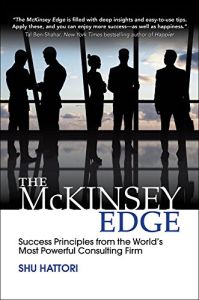Join getAbstract to access the summary!

Join getAbstract to access the summary!
Shu Hattori
The McKinsey Edge
Success Principles from the World’s Most Powerful Consulting Firm
McGraw-Hill, 2016
What's inside?
McKinsey & Company churn out top execs; are its leadership principles the key to the C-suite?
Recommendation
This leadership guide leaves the philosophizing aside and focuses on the mechanics of managerial efficacy. McKinsey & Company alum Shu Hattori lays out basic and best practices culled from his days at “the Firm.” His manual offers guidance for getting ahead, improving communication, increasing productivity and overdelivering in your personal and professional life. Each of the 47 principles seems simple by itself, but taken together these nuggets provide an excellent framework for growth. getAbstract recommends Shu’s something-for-everyone compendium as a fundamental addition to your leadership development library.
Summary
About the Author
Shu Hattori is a leadership trainer and former engagement manager in the high-tech sector for McKinsey & Company.


















Comment on this summary